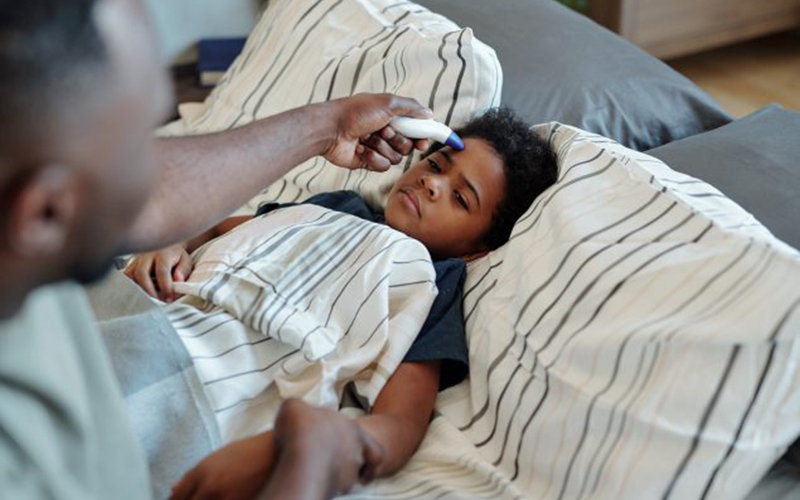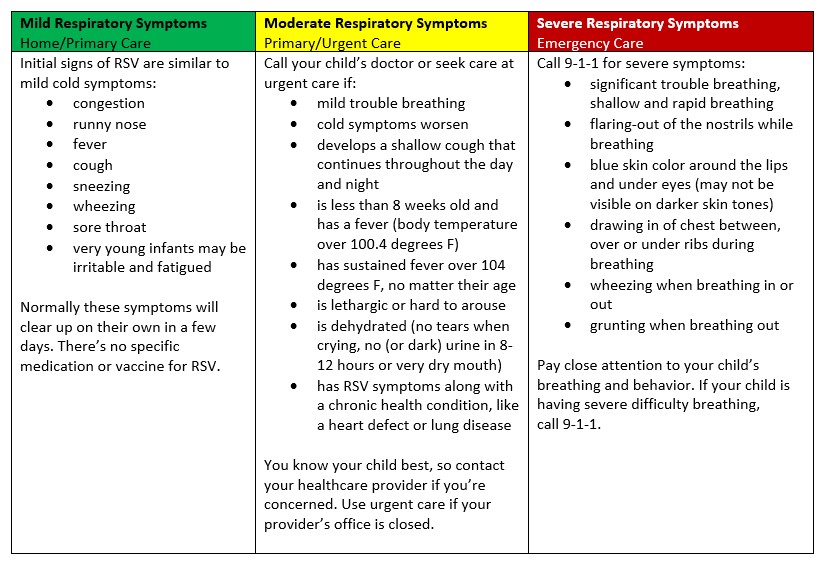
What You Should Know
There are several respiratory illnesses circulating together this year causing mild to moderate or severe symptoms. It’s hard to tell the difference between influenza, COVID-19, RSV and other respiratory viruses so watching for severity of symptoms is very important. RSV, or Respiratory Syncytial Virus, is a respiratory illness impacting babies and young children particularly early and extremely hard this year, causing many families to seek urgent or emergency care and leading to hospitalization in some cases.
Valley and hospitals across our region are caring for an unusually high number of children and adults with respiratory illness this year. With limited beds available for pediatric and adult ICU care and long wait times for emergency and urgent care, our goal is to keep you as healthy as possible and share information about what to do if illness should strike and when to seek medical attention.
Symptom Management
Antibiotics are not effective against viruses. The most important thing you can do is manage the symptoms:
- Manage fever and pain with over-the-counter fever reducers and pain relievers, such as acetaminophen or ibuprofen. (Never give aspirin to children.)
- Drink enough fluids to prevent dehydration (loss of body fluids). This can include water, Gatorade, or fruit juice like orange juice.
- Talk with your healthcare provider before giving your child nonprescription cold medicines. Some medicines contain ingredients that are not good for children.
- Get plenty of rest.
- Use a humidifier to help with cough and congestion.
- If you need a cough suppressant, try Dextramethorphan or Delsym.
- Use nasal saline for nasal irrigation and congestion.
- Warm liquids can also help with cough, such as tea or just warm water.
When to Seek Care

View a more complete list of illnesses and conditions with a guide about where to seek care.
What is RSV?
RSV is extremely prevalent this year. It is a highly contagious virus passed from person to person that affects the nose, throat and lungs. People of any age can get RSV, but it is most serious for young children and older adults. For healthy people, RSV usually results in a cold, but some get very sick, developing bronchiolitis, wheezing/asthma or pneumonia. Those with severe illness may need to be admitted for more aggressive treatment to remove secretions, provide oxygen to help with breathing difficulties and/or IV hydration.
Which babies and young children are most at risk of severe illness from RSV?
Some babies and young children have a higher risk of a severe RSV infection. They include:
- Babies who are 12 weeks old or younger
- Premature babies (especially those born before 29 weeks gestation)
- Babies born with low birth weight
- Children with chronic lung disease, certain heart defects or weak immune systems due to illness or treatments
- Children exposed to secondhand smoke at home or whose mothers smoked during pregnancy
How can my family avoid getting RSV?
- Stay home from work or school if ill.
- Wear a well-fitting, high-quality mask in indoor public settings.
- Protect vulnerable children and adults at gatherings by being up-to-date with recommended influenza and COVID-19 vaccinations.
- Protect newborns and other vulnerable patients at risk for severe complications by keeping ill people away and ensuring caregivers and contacts are vaccinated against influenza and COVID-19.
- Avoid contact with others if an individual is ill regardless of symptom severity and COVID-19 testing status.
- Wash your hands frequently.
- Improve indoor air ventilation and filtration.
Photo courtesy of Centers for Disease Control

